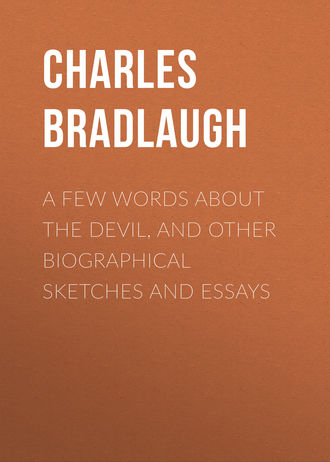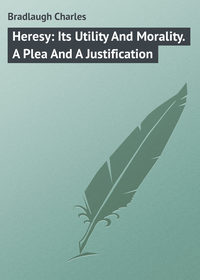 полная версия
полная версияA Few Words About the Devil, and Other Biographical Sketches and Essays
Dr. Lyman Beecher issued, some few years since, a series of lectures on Atheism, without merit or fairness, and which are here only alluded to as fairly illustrating a certain class of orthodox opposition. His statements of Atheistic opinions are monstrous perversions, and his answers are directed against the straw man built together by himself. The doctrine of "almighty chance" which Dr. Beecher attacks, is one which I never heard an educated Atheist teach, and the misrepresentation of Freethought objects is so obvious that it can only be effectual with those who have never freed themselves from the trammels which habit and fashion-faith bound upon them in their infancy, and which have strengthened with their growth. The Rev. J. Orr, in his "Treatise on Theism," says, "All inquiry about chance is, however, impertinent in the present day. The idea is an infantine one, possible of entertainment only in the initial state of human knowledge. Chance is not the position relied upon by modern Atheism. And when, therefore, the Theist expends the artillery of his argument upon this broken down and obsolete notion, he is intermeddling with the dead, and after accomplishing the destruction of the venerable fallacy, the modern Atheist will likely ask him to come down to the nineteenths century and meet him there."
The only attempt at argument in Dr. Beecher's book is founded on the assumption:
1st. That there is an existence called matter.
2d. That there are certain effects perceivable which can not result from matter.
3d. That therefore there is a God the cause for these effects. Where are there any Materialists who accept Dr. Beecher's limitation of matter? It is a word I do not use myself.
On the question of evil, Coleridge, in his "Aids to Reflection," says: "1st. That evil must have had a beginning, since otherwise it must either be God or a co-eternal and co-equal rival with God. 2d. That it could not originate in God; for if so, it would at once be evil and not evil, or God would be at once God – that is, infinite goodness – and not God." If God be infinite goodness, can evil exist at all? It is necessary above all that we should understand the meaning of each word we use. Some men talk as if their words were intended rather to conceal than to express their ideas. So far as this essay is concerned I will endeavor to avoid this difficulty by explicitly defining each special word I use. Dugald Stewart, indeed, says, "That there are many words used in philosophical discourse which do not admit of logical definition, is abundantly manifest. This is the case with all those words that signify things un-compounded, and consequently unsusceptible of analysis – a proposition, one should think, almost self-evident; and yet it is surprising how very generally it has been overlooked by philosophers."
The advantages, however, accruing from frequent definitions are very great; at the least they serve to explain what was meant by the persons using the word, whereas sometimes two men confuse each word by using words to which each attaches an opposite or a dissimilar value.
Men will talk of "First Cause," and "Intelligent First Cause." Do they know what they mean? I confess I do not, and from the manner in which they use the words, the most charitable conclusion is that they use them because others have done so, and for no worse or better reason. They talk of the "Beauties of Creation," and "Works of the Great Creator." If by creation is meant the origin of existence, then each utterance of the phrase is an absurdity. The human mind is utterly incapable of construing it in thought as possible that the complement of existence has either been increased or diminished. Man can neither conceive nothing becoming something nor something becoming nothing.
Definitions. – 1. By existence, or substance, I mean that which is in itself and is conceived per se– that is, the conception of which does not require the conception of anything else as antecedent to it. Whenever I use the words universe or matter, I use them in the same sense as representing the totality of existence. Existence can only be known in its modes, and these by their attributes. 2. By attribute, I understand that by which I cognize any mode of existence. Hardness, brightness, color, life, form, etc., are attributes of conditional existence. 3. By mode, I understand each cognized condition or accident of existence. 4. By eternity I mean indefinite duration; that is duration which is to me illimitable. 5. By infinity, I mean indefinite extension. The axioms, so far as I shall give them, are in the precise language of Spinoza. "1. Everything which is, is in itself, or in some other thing.. 2. That which cannot be conceived through another per aliud, must be conceived per se. 3. From a given determinate cause, the effect necessarily follows; and, vice versa, if no determinate cause be given, no effect can follow. 4. The knowledge of an effect depends on a knowledge of the cause, and includes it. 5. Things that have nothing in common with each other, can not be understood by means of each other – that is, the conception of one does not involve the conception of the other."
Propositions. – Existence is prior to its modes. This follows from definitions 1 and 3, because modes of existence are conceived relatively and in dependence on existence, which is absolutely precedent in such conception. Existences having different attributes have nothing in common with each other. This is founded on definition 1. Existences have nothing in common with each other, can not be the cause of, or affect one another. If they have nothing in common, they can not be conceived by means of each other (per axiom 5), and they can not be conceived as relating to each other, but must be conceived per se (per definition 1); and as (per axiom 4) the knowledge of an effect depends on the knowledge of the cause and includes it, it is impossible to conceive any existence as an effect, so long as you can not conceive it in relation to any other existence. By "cause" in the absolute, I mean "existence." In its popular or relative sense, I use "cause" as an effect of some precedent causative influence, itself the cause of some consequent effect, as the means toward an end, in the accomplishment of which end it completes itself.
What fact is there so certain that I may base all my reasonings upon it? My existence is this primary fact; this, to me, indubitable certainty. I am. This logic can neither prove nor disprove. The very nature of proof is to make a proposition more clear to the mind than it was before, and no amount of evidence can in-crease my conviction of the certainty of my own existence. I do not affirm that I am in existence, but I affirm that there is existence. This existence is either eternal, that is, unlimited in duration, that is, indefinite in duration; or else it had a beginning, that is, it has been created. If created, then such creation must be by some existence the same as itself, or by some existence differing from itself. But it can not have been created by any existence the same as itself, because to imagine such, would be to conceive no more than a continuance of the same existence – there would be no discontinuity. "But," says S. T. Coleridge, "where there is no discontinuity, there can be no origination." And it can not have been created by any existence differing from itself, because things which have nothing in common with one another can not be the cause of, or affect, one another. Therefore, this existence has not been created, that is, its duration is indefinite – that is, you can not conceive a beginning – that is, it is eternal. This eternal existence is either infinite in extent, that is, is unlimited in extent, or it is finite, that is, limited. If limited, it must be limited by an existence the same as itself, or by an existence differing from itself. But the same arguments which applied to a limitation of duration, also apply to a limitation of extension. Therefore, this existence is unlimited in extent; that is, is infinite and eternal – that is, there is only one existence. It is at this point that Atheism separates from Pantheism. Pantheism demonstrates one existence, but affirms for it infinite attributes. Atheism denies that attributes can be infinite. Attributes are but the distinguishing characteristics of modes, and how can that be infinite which is only the quality of finity? Men do not talk of infinite hardness or of infinite softness; yet they talk of infinite intelligence. Intelligence is not an existence, and the word is without value unless it strictly comprehend, and is included in, that which is intelligent. The hardness of the diamond, the brilliancy of the burnished steel, have no existence apart from the diamond or the steel. I, in fact, affirm that there is only one existence, and that all we take cognizance of is mode, or attribute of mode, of that existence.
I have carefully abstained from using the words "matter" and "spirit." Dr. Priestly says: "It has generally been supposed that there are two distinct kinds of substance in human nature, and they have been distinguished by the terms matter, and spirit, or mind. The former of these has been said to be possessed of the property of extension, viz., of length, breadth and thickness, and also of solidity or impenetrability, and consequently of a vis inertiæ; but it is said to be naturally destitute of all other powers whatever. The latter has of late been defined to be a substance entirely destitute of all extension, or relation to space, so as to have no property in common with matter; and therefore to be properly immaterial, but to be possessed of the powers of perception, intelligence, and self-motion. Matter is alleged to be that kind of substance of which our bodies are composed, whereas the principle of perception and thought belonging to us is said to reside in a spirit, or immaterial principle, intimately united to the body; while higher orders of intelligent beings, and especially the Divine Being, are said to be purely immaterial. It is maintained that neither matter nor spirit (meaning by the latter the subject of sense and thought) correspond to the definitions above mentioned. For that matter is not that inert substance that it has been supposed to be; that powers of attraction or repulsion are necessary to its very being, and that no part of it appears to be impenetrable to other parts; I therefore define it to be a substance possessed of the property of extension, and powers of attraction or repulsion; and since it has never yet been asserted that the powers of sensation and thought are incompatible with these (solidity or impenetrability, and, consequently, a vis inertiæ, only having been thought to be repugnent to them), I therefore maintain that we have no reason to suppose that there are in man two substances so distinct from each other as have been represented. It is likewise maintained that the notion of two substances that have no common property, and yet are capable of intimate connection and mutual action, is absurd."
I do not conceive spirit or mind as an existence. By the word mind, I simply express the totality of perception, observation, collection, and recollection of perceptions, reflection and various other mental processes. Dugald Stewart, in his "Essay on Locke," says: "We are conscious of sensation, thought, desire, volition, but we are not conscious of the existence of the mind itself."
It is urged that the idea of God is universal. This is not only not true, but I, in fact, deny that any coherent idea exists in connection with the word "God." The chief object to which the emotions of any people were directed in ancient times became their God. When these emotions were combined with vague traditions, and a priesthood became interested in handing down the traditions, and increasing the emotions, then the object becoming sacred was hallowed and adored, and uncertain opinions formed the basis of a creed. Any prominent phenomenon in the universe, which was not understood, was personified, as were also the various passions and phases of humanity. These, in time, were preached as religious truths, and thus diverted the people from inquiry into the natural causes of phenomena, which they accounted for as ordained by God, and when famine or pestilence occurred, instead of endeavoring to remove its cause or using preventive measures against a recurrence of the evil, they sought to discover why the supernatural power was offended, and how it might be appeased, and ascribing to it their own passions and emotions, they offered prayers and sacrifices. These errors becoming institutions of the country, the people, prompted by their priests, regarded all those who endeavored to overturn them by free and scientific thought and speech as blasphemers, and the Religion of each State has, therefore, always been opposed to the education of the people.
Archbishop Whately, in his "Elements of Rhetoric," part 1, chap, ii, sec. 5, urges that "those who represent God or Gods as malevolent, capricious, or subject to human passions and vices, are invariably to be found among those who are brutal and uncivilized." We admit this, but ask is it not the fact that both the Old and New Testament teachings do represent God as malevolent, capricious, and subject to human passions and vices – that is, are not these bible views of God relics of a brutal and uncivilized people?
There is, of course, not room in a short essay like the present to say much upon the morality of Atheism, and it should therefore suffice to say, that truth and morality go hand in hand. That that is moral which tends to the permanent happiness of all. The continuance of falsehood never can result in permanent happiness; and therefore if Atheism be truthful, it must be moral, if it be against falsehood, it must tend to human happiness.
Yet if quoting great names will have effect, Lord Bacon, who is often quoted against Atheism, also says: "Atheism leaves a man to sense, to philosophy, to natural piety, to laws, to reputation, all of which may be guides to an outward moral virtue, though religion were not; but superstition dismounts all these, and erecteth an absolute monarchy in the mind of men; therefore Atheism never did perturb states, for it makes men wary of themselves as looking no further; and we see the times inclined to Atheism, as the times of Augustus Caesar were civil times; but superstition has been the confusion of many states." George Combe says: "I have known men in whom the reasoning organs were amply developed and well cultivated, who assured me that they could not reach the conviction of the being of a God. I have known such men equal in point of integrity and practical benevolence to the most orthodox believers." In the West Riding of Yorkshire, among the men themselves, a wealthy employer bore favorable testimony to the conduct and intelligence of Atheistic working men. Nay, even the fanatical Dr. Lyman Beecher is obliged to concede that Atheism made converts among "females of education and refinement – females of respectable standing in society."
HAS MAN A SOUL?
[This lecture was originally delivered to the Sheffield Secular Society, and was printed from the reporter's notes without efficient correction from myself, I, at that time, suffering under a severe attack of acute rheumatism. The lecture has since been often re-delivered; and three editions having been exhausted, I have again corrected and revised the present edition. It is not intended as an answer to the question which forms the title, but it is intended to provoke thought upon this important subject.]
What do you mean by soul? What is the soul? Is it I? Is it the body? Is it apart from the body? Is it an attribute of the body? Has it a separate and distinct existence from the body? What is the soul? If I ask one of those who claim to be considered orthodox men, they will tell me that the soul is a spirit – that the soul lives after the body is dead. They will tell me that the soul is immortal, and that the body is mortal; that the soul has nothing whatever in common with the body; that it has an existence entirely independent of the body. They will tell me that after the body has decayed – after the body has become re-absorbed in the universe, of which it is but a part, that the soul still exists. Is there any proof of the existence of the same individual soul apart from all material conditions? I have endeavored to examine this subject, and, up to the present time, I have not found one iota of proof in support of the positions thus put forward. I have no idea of any existence except that of which I am part. I am. Of my own existence I am certain I think. I am. But what is it that thinks? Is it my soul? Is it "me," and yet distinct from me? I am but a mode of existence. I am only part of the great universe. The elements of which I am composed are indissolubly connected with that great existence which is around me and within me, and which I help to make up. If men tell me I am a compound, and not a compound – a mixture, and not a mixture – a joining together, and not a joining together – of two entirely different existences, which they call "matter" and "spirit," I am compelled to doubt those men. The ability to think is but an attribute of a certain modification of existence. Intelligence is a word by which we express the sum of certain abilities, always attending a certain mode of existence. I find intelligence manifested so far as organization is developed. I never find intelligence without animal organization. I find intelligence manifested in degree, only so far as I find a higher or lower type of organization – that is, I find man's intellectual faculties limited by his organization. But the orthodox tell me that my soul has an immaterial existence, independent of all organization – independent of all climatic conditions – independent of all education. Is that so? When does the soul come into man? When does it go out of man? If the soul is immortal, why is it that standing here, in the prime of health and strength, if part of that roof should fall fracturing my skull, and pressing upon my brain – how is it, if my soul is not subject to material conditions, that it then ceases to act? Is the plaster roof more powerful than my immortal soul? Or is it that intelligence is the necessary result of a certain condition of existence, and that the moment you destroy that condition – the moment you destroy the organization – the result ceases to be realizable? By the course of reasoning you adopt (says the orthodox objector) you reduce man to the same level as the beasts. And why not? I stand on the river's bank, I see there a man full grown, possessed of the physical figure of man, but an idiot – an idiot from his birth upward – one who could not, even if he would, think and act as other men. A little child is there playing on the bank, and the idiot, having large destructive propensities, has thrust the child into the water, and he stands there jabbering and gesticulating while the little child is drowning in the river. And see how half-vacantly, half-triumphantly, he points to the helpless child. A Newfoundland dog has come to the bank; it jumps in and brings the child out and saves its life. Yet theologians tell me that the idiot has a soul, and that the Newfoundland dog has not one. I can not understand these nice distinctions, which make the man so superior to the beast in matters in which he is positively inferior. Man has doubtless an organization on the whole far superior intellectually to that of any other animal, but he is only superior by virtue of his superior organization and its consequent susceptibility for development or education. Many brutes can see more clearly than man; but they possess not the capability for the manufacture of telescopes to aid their vision. Many brutes can run more swiftly, but they manifest no capacity for the subjugation of a steam power which far outstrips their speed. But man himself, a well-organized, thoughtful, intelligent, well-educated man, by a fall from a horse, by a tile from a roof, may receive an injury to his nervous encephalic apparatus, and may be, even while a man in shape, as low as the brute in the imbecility of his reason, and inferior to the brute in physical strength. There is as much difference between different races of men, there is, in fact, more difference between a pure Caucasian and a Sahara negro, than between the Sahara negro and the infant chimpanzee.
When did the soul come into the body? Has it been waiting from all eternity to occupy each body the moment of birth? Is this the theory that is put forward to man – that there are many millions of souls still waiting, perhaps, in mid air, 'twixt heaven and earth, to occupy the still unborn babes? Is that the theory? Or do you allege that God specially creates souls for each little child at the moment it is born or conceived? Which is the theory put forward? Is it that the soul being immortal – being destined to exist for ever, has existed from all eternity? If not, how do you know that the soul is to exist for ever; when it only comes into existence with the child? May not that which has recently begun to be, soon cease to be? In what manner does the soul come into the child? Is it a baby's soul, and does it grow with the child? or, does it possess its full power the moment the child is born? When does it come into the child? Does it come in the moment the child begins to form, or is it the moment the child is born into the world? Whence is it this soul comes? Dr. Cooper, quoting Lawrence on the "Functions of the Brain," says: "Sir Everard Home, with the assistance of Mr. Bauer and his microscope, has shown us a man eight days old from the time of conception, about as broad and a little longer than a pin's head. He satisfied himself that the brain of this homunculus was discernible. Could the immaterial mind have been connected with it at this time? Or was the tenement too small even for so etherial a lodger? Even at the full period of uterogestation, it is still difficult to trace any vestiges of mind: and the believers in its separate existence have left us quite in the dark on the precise time when they suppose this union of soul and body to take place." Many of those who tell me that man has a soul, and that it is immortal – that man has a soul, and that the beast has not one – forget or ignore the fact that at a very early stage in the formation of the brain the state of the brain corresponds to that of the avertebrated animal, or animal that is without vertebra. If the brain had stopped in its first month's course of formation, would the child have had a soul? If it would have had a soul, then have avertebrated animals souls also? If you tell me it would not have had a soul, then I ask, How do you know it? and I ask you what ground you have for assuming that the soul did not begin to form with the formation of the brain? I ask you whether it was pre-existing, or at what stage it came? In the second month this brain corresponds then to the brain of an osseous fish. Supposing the development of the child had been then stopped, had it a soul at that time? If so, have fishes souls? Again, if you tell me that the child had not a soul, then, I ask, why not? How do you know it had not? What ground have you for alleging that the soul did not exist in the child? We go on still further, and in the third month we find that brain corresponds then to that of a turtle, and in the fourth to that of a bird; and in the fifth month, to an order termed rodentia; sixth, to that of the ruminantia; seventh, to that of the dugitigrada; eighth, to that of the quadrumana; and not till the ninth month does the brain of the child attain a full human character. I, of course, here mean to allege no more than Dr. Fletcher, who says, in his "Rudiments of Physiology," quoted by the author of the "Vestiges of Creation": "This is only an approximation to the truth; since neither is the brain of all osseous fishes, of all turtles, of all birds, nor of all the species of any of the above order of mammals, by any means precisely the same; nor does the brain of the human fetus at any time precisely resemble, perhaps, that of any individual whatever among the lower animals. Nevertheless it may be said to represent, at each of the above-named periods, the aggregate, as it were, of the brains of each of the tribes stated."








